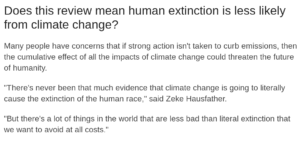https://twitter.com/RogerAPielkeSr/status/1223357388138270720
#
https://www.bbc.com/news/science-environment-51281986
Climate change: Worst emissions scenario ‘exceedingly unlikely’ – January 29, 2020
The worst-case scenario for emissions of CO2 this century is no longer plausible, say researchers.
Referred to as “business as usual”, the scenario assumes a 500% increase in the use of coal, which is now considered unlikely.
Climate models suggest that this level of carbon could see warming of up to 6C by 2100, with severe impacts.
Researchers say that on current trends, a rise in temperatures of around 3C is far more likely…
BBC asks: Does this review mean human extinction is less likely from climate change?
Many people have concerns that if strong action isn’t taken to curb emissions, then the cumulative effect of all the impacts of climate change could threaten the future of humanity.
“There’s never been that much evidence that climate change is going to literally cause the extinction of the human race,” said Zeke Hausfather.
“But there’s a lot of things in the world that are less bad than literal extinction that we want to avoid at all costs.” …
Does this mean that climate scientists have been exaggerating the threat?
This is more about scientific assumptions added to a communications cock-up.
Very few scientists realised that RCP8.5 was originally a 90th percentile outcome, not a most likely or business-as-usual outcome. They assumed too much, when they should perhaps have checked, say the authors of the review.
“At the end of the day, scientists have to take responsibility for what they choose as input data, and there should be a degree of due diligence,” said Glen Peters, from the CICERO Center for International Climate Research in Norway.
“How many of your average climate scientists know the nuances of RCP8.5? It would certainly be interesting to know.”
The media, taking their steer from scientists, have tended to use the highest impacts when reporting on projections based on emissions scenarios.
“That’s not to say that these highest-end impacts are impossible to happen, but it is not business-as-usual. And that’s the point we’re really trying to make in this piece.”
…



